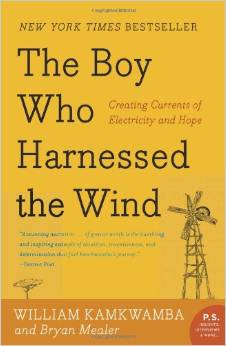Recently I have been reading two books that talk about conditions in Africa. I didn't do this intentionally; it just worked out that way. Today I'll review the first book.
The Boy Who Harnessed the Wind by William Kamkwamba and Bryan Mealer is about William Kamkwamba who is from Malawi and how he coped with the abject poverty he lived in. His story gives me hope for the people of Africa.
His family are poor farmers, like most of the people in Malawi. They have no electricity and no indoor plumbing. Even though it would be possible to grow crops year-round because of the climate, the farmers only grow crops during the rainy season which is the summertime for them (our winter). They are very much subject to the whims of the weather because they don't have irrigation to deal with lack of rain or the dry season. Because of this (and government corruption--a constant problem), in 2002, they suffered a devastating famine. Many people died from starvation and William's family just barely survived. It was heartbreaking to read about and I wanted to go out immediately and buy a bunch of food. I never want to be in such a position. When my daughter was turning up her nose at the dinner I had prepared that night, I felt incredibly irritated and told her about this famine. (It didn't make any difference in her attitude.)
Because of the famine, his father incurred many debts and he was not able to afford the school fees for his son William who was ready for secondary school--seventh grade. This was very disappointing to both of them. But instead of wasting his days away like so many other boys his age who also couldn't afford school, he started using the library near his home which had been stocked by Americans. He found books on physics and electricity and he used these books to make his own windmill using parts from anything he could find. His resources were incredibly limited (remember no money) and it was amazing that he could put it all together. He ended up wiring his house so that they could have electric lights in his home. Eventually he wanted to build another windmill with a pump attached to his family's well so they could water their crops and have a more stable food supply.
In the meantime, some influential people discovered his windmill and with the help of generous donors he was able to go back to school. Last year he graduated with a 4-year-degree from Dartmouth College. He has a lot of plans to try to help the people of his country. I really hope he is successful.
He gave a TED talk that you can listen to here: http://www.ted.com/talks/william_kamkwamba_on_building_a_windmill?language=en.
He also has a blog where he talks about what he has done recently:
http://williamkamkwamba.typepad.com/
The Boy Who Harnessed the Wind by William Kamkwamba and Bryan Mealer is about William Kamkwamba who is from Malawi and how he coped with the abject poverty he lived in. His story gives me hope for the people of Africa.
His family are poor farmers, like most of the people in Malawi. They have no electricity and no indoor plumbing. Even though it would be possible to grow crops year-round because of the climate, the farmers only grow crops during the rainy season which is the summertime for them (our winter). They are very much subject to the whims of the weather because they don't have irrigation to deal with lack of rain or the dry season. Because of this (and government corruption--a constant problem), in 2002, they suffered a devastating famine. Many people died from starvation and William's family just barely survived. It was heartbreaking to read about and I wanted to go out immediately and buy a bunch of food. I never want to be in such a position. When my daughter was turning up her nose at the dinner I had prepared that night, I felt incredibly irritated and told her about this famine. (It didn't make any difference in her attitude.)
Because of the famine, his father incurred many debts and he was not able to afford the school fees for his son William who was ready for secondary school--seventh grade. This was very disappointing to both of them. But instead of wasting his days away like so many other boys his age who also couldn't afford school, he started using the library near his home which had been stocked by Americans. He found books on physics and electricity and he used these books to make his own windmill using parts from anything he could find. His resources were incredibly limited (remember no money) and it was amazing that he could put it all together. He ended up wiring his house so that they could have electric lights in his home. Eventually he wanted to build another windmill with a pump attached to his family's well so they could water their crops and have a more stable food supply.
In the meantime, some influential people discovered his windmill and with the help of generous donors he was able to go back to school. Last year he graduated with a 4-year-degree from Dartmouth College. He has a lot of plans to try to help the people of his country. I really hope he is successful.
He gave a TED talk that you can listen to here: http://www.ted.com/talks/william_kamkwamba_on_building_a_windmill?language=en.
He also has a blog where he talks about what he has done recently:
http://williamkamkwamba.typepad.com/

Comments
Post a Comment